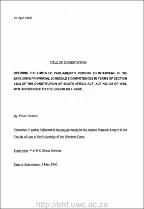Defining the limits of parliament's powers to intervene in the Exclusive provincial schedule 5 competences in terms of section 44(21of the constitution of south africa act, act no.108 of 1996, With reference to the liquor bill case
| dc.contributor.advisor | Steytler, C | |
| dc.contributor.author | Enver, Daniels | |
| dc.date.accessioned | 2023-06-12T07:28:03Z | |
| dc.date.available | 2023-06-12T07:28:03Z | |
| dc.date.issued | 2000 | |
| dc.identifier.uri | http://hdl.handle.net/11394/10119 | |
| dc.description | Magister Legum - LLM | en_US |
| dc.description.abstract | Constitutional law prescribes how power is exercised by the different branches of government and organs of state. ln a federal state or a unitary state in which there is a devolution of power to the regions, the allocation or distribution of specific powers between the center and the provinces is of fundamental importance. Uncertainty about either legislative authority can lead to chaos and instability and threaten the nation's survival. the powers of each branch of government are clearly spelled out in constitutional states, whether federal or unitary. Generally speaking, infringements of one another's legislative powers are not allowed, except under certain clearly defined circumstances, as will be demonstrated later on herein. | en_US |
| dc.language.iso | en | en_US |
| dc.publisher | UWC | en_US |
| dc.subject | parliament | en_US |
| dc.subject | constitution | en_US |
| dc.subject | statutes | en_US |
| dc.subject | economic unity | en_US |
| dc.title | Defining the limits of parliament's powers to intervene in the Exclusive provincial schedule 5 competences in terms of section 44(21of the constitution of south africa act, act no.108 of 1996, With reference to the liquor bill case | en_US |

